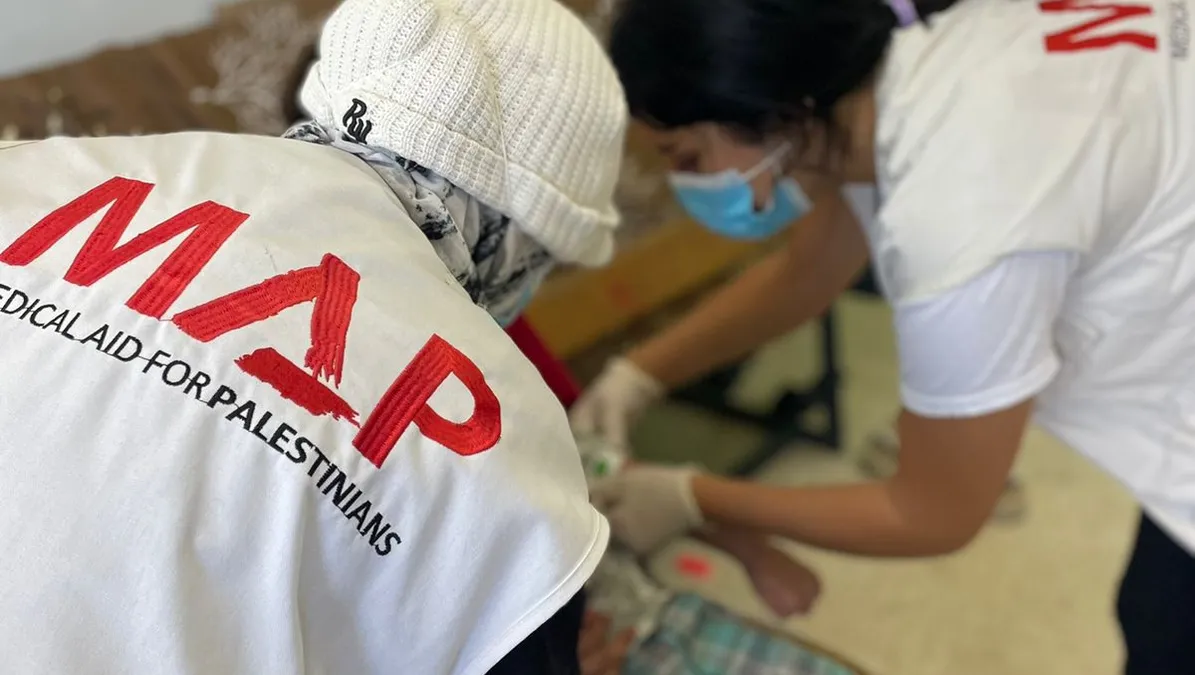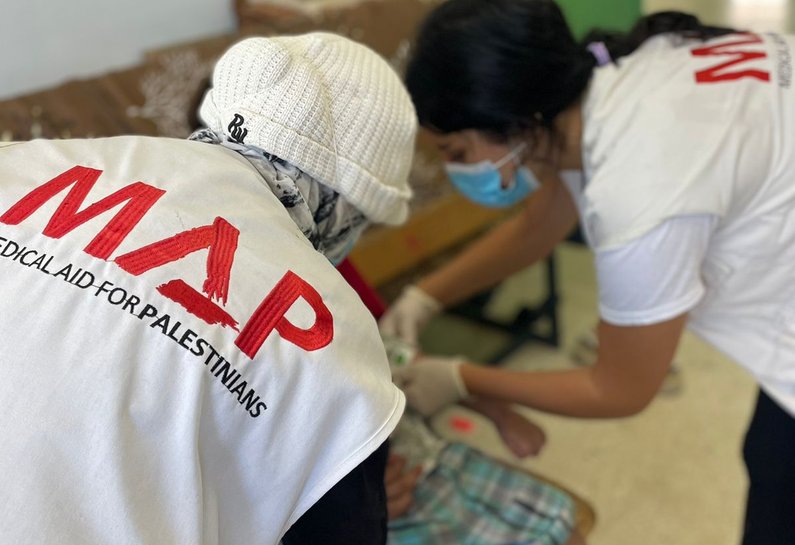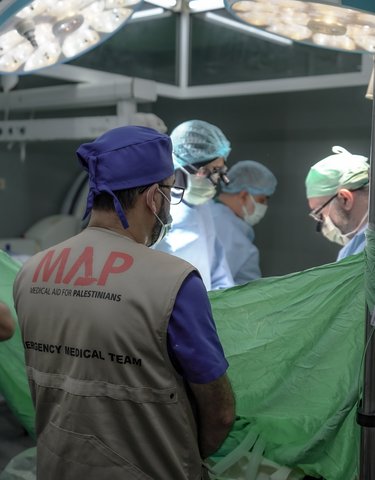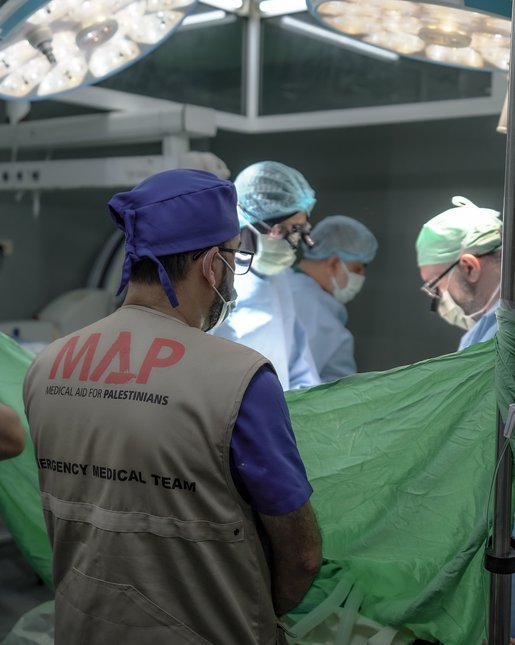MAP’s midwives support women and children displaced in Lebanon’s shelters
15 October 2024

Over the past three weeks, Israeli military airstrikes and attacks have escalated across southern Lebanon and Beirut. This comes after more than a year of armed conflict between the Israeli military and Hezbollah, in which at least2,100 peoplehave been killed in Lebanon and more than10,200injured. Since 8 October 2023, more than680,000 peoplehave also been displaced from their homes, mainly from south Lebanon. Lebanese authorities estimate the total number of internally displaced people isover one million.

As the humanitarian crisis in Lebanon deteriorates, Medical Aid for Palestinians (MAP) is supporting affected communities, particularly Palestinian refugees. In this interview, Ola, a midwife working with MAP shares her experiences and highlights the health challenges facing pregnant women, mothers and children who have been forced to flee their homes and are now staying in collective shelters.
Can you tell us what you have experienced over the past few weeks?
We have visited several schools run by UNRWA (the UN Relief and Works Agency) that are currently being used as collective shelters for displaced people. Families are given mattresses, blankets, and some basic necessities, but the trauma of being displaced is heartbreaking. Each person had a life, dreams, a home, but now they are struggling. They left everything behind and fled their homes. Some families were forced to separate. The memories of violence, bombings, and loss haunt them. The needs are overwhelming, but we are doing everything we can to make life a little easier for them.
What are the main health challenges facing pregnant women, mothers and children in the shelters?
Cases of health issues like diarrhea and constipation are common. There is only one toilet in most shelters, and people sometimes have to go down three floors to reach it, so they limit their intake of liquids. Infections can spread easily in shared bathrooms, and the limited variety of food contributes to malnutrition and constipation. There is a risk of seeing more lice cases in children due to limited access to shower space and hot water. Additionally, the constant stress and uncertainty are taking a toll on the mental health of women and children.
Can you describe the living conditions in the shelters, and how they impact the health and wellbeing of women and children?
The shelters do their best, with local partners, helping to provide food, water, and hygiene support, but it’s not enough. In many cases, there is no hot water in the bathrooms for people to shower. The lack of privacy and the unsanitary conditions affect everyone, especially pregnant women, new mothers and young children.
All the women we visited were tired and sometimes distressed, as they had endured a harrowing journey under the sounds of missiles to reach this shelter. They are living among strangers, in an unfamiliar place, and are constantly reminded of the sounds of missiles and destruction. This stress adds to the difficulties they face in maintaining their health and caring for their children.
What kind of healthcare and support do you provide?
We prioritise pregnant and lactating women during our visits. We conduct thorough check-ups, measuring blood pressure, temperature, and the baby’s growth, as well as testing for urinary tract infections and malnutrition. We also provide emotional support, teaching them how to care for their babies and themselves during this difficult time. We dispel myths about pregnancy and breastfeeding, offering advice to help them make informed decisions. It’s not just about medical care; it’s about showing these women that someone is there for them, that they are not alone.
Can you describe a typical day for you when visiting the shelters?
A typical day starts by coordinating with our MAP partners running the shelter’s activities to identify the women who need our services. We use various medical tools to check on the health of pregnant women and babies, from listening to fetal heartbeats to screening for malnutrition. Each visit is different because the environment is tense, and the women are under extreme stress. Sometimes, just listening to their baby’s heartbeat brings them a sense of relief and joy. These are powerful moments that remind us why our work is so important.
Can you share any moments of hope you’ve experienced?
One of the most touching moments was when a pregnant woman, terrified that she had lost her baby, was able to hear her child’s heartbeat. The mother’s despair turned to joy, and their smile returned. Despite everything these women have been through, they still find joy in knowing their babies are safe. The look of relief and happiness on her face is something I will never forget.
What impact is MAP’s work having for displaced communities?
MAP has an incredibly positive impact. Our check-ups for pregnant and lactating women help them feel secure. We provide crucial information, helping to correct misconceptions about pregnancy and babies. We also offer emotional support, reminding women that they are in a safe space now. We help them focus on the present and move forward, even in the face of unimaginable hardship.
What message would you like to share with the international community regarding the situation in Lebanon, particularly for Palestinian refugees?
The situation for Palestinian refugees in Lebanon has always been challenging. Living in overcrowded refugee camps, facing mental health issues and struggling to meet their basic needs, they relied heavily on UNRWA for support. However, now many of these camps have become too risky to stay in, forcing them to move to safer places. Displaced from their homeland to Lebanon, they are now being displaced even from their homes in camps. Things have also become harder for them in the shelters in terms of basic needs, food, water and privacy.
The international community must not forget these people. Women and children, in particular, are bearing the brunt of this crisis. They need urgent support to survive and rebuild their lives.
With your help, MAP can continue to provide vital healthcare to Palestinians in Lebanon, Gaza and the West Bank.

